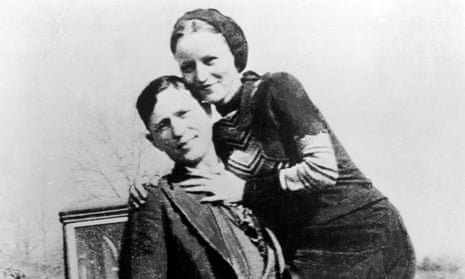An old green notebook believed to contain poetry written by the notorious outlaws Bonnie Parker and Clyde Barrow has been put up for auction by Barrow’s nephew.
The pair, who went on a 21-month crime spree robbing banks, gas stations and restaurants at the height of the US’s Great Depression, were shot and killed in a police ambush in Louisiana in 1934. Barrow was 24, and Parker, who had teamed up with Barrow on his release from prison years earlier, was 23. The pair became even more famous when they were played by Faye Dunaway and Warren Beatty in the 1967 film, Bonnie and Clyde.
Parker was known to have written poetry – Jeff Guinn’s biography of the outlaws, Go Down Together, recounts how she wrote verses including The Story of Suicide Sal, about a naive country girl who falls for a man who lures her into crime, while in prison. But the notebook, which was among a collection of items belonging to Barrow’s older sister Nell May Barrow and put up for auction by her son, reveals that Barrow also tried his hand as a poet. According to Heritage Auctions, the “year book” was used by Parker and Barrow to write poetry about “their life of crime and doomed efforts to elude capture”.
One of the poems, written in pencil and then cut out and kept in an envelope labelled “written by Bonnie”, is the verse that Parker is best known for: The Story of Bonnie and Clyde, which opens: “You’ve read the story of ‘Jesse James’, / Of how he lived and died. / If you’re still in need / Of something to read, / Here’s the story of ‘Bonnie and Clyde.’”
It ends, presciently: “Some day they’ll go down together / they’ll bury them side by side / to few it’ll be grief / to the law a relief / but it’s death for Bonnie and Clyde.”
After the pair were killed in 1934, Parker’s mother Emma and Barrow’s sister Nell wrote a biography of their famous relatives, Fugitives. It featured a copy of the poem, and an explanation of its provenance: “Bonnie gave me the poem that night, ‘The Story of Bonnie and Clyde’. I shall present it here because it gives a little of the inside angle of the case … They would be back in two weeks, they promised, but in two weeks they were dead.”
The year book also includes a 13-stanza poem, written across four pages, ostensibly by Barrow, which opens: “Bonnie s Just Written a poem / the Story of Bonnie & Clyde. So / I will try my hand at Poetry / With her riding by my side.”
It continues: “We donte want to hurt anney one / but we have to Steal to eat. / and if it’s a shoot out to / to live that’s the way it / will have to bee. / We have kidnapped some / people. And tied them to a tree / but not so tight that after we / were gone tha could not get / themselves free. / We are going home tomorrow / to look in on the folks. We will / meet then out near Grape Vine / if the Laws donte get there / first. / Now that’s not as good as / Bonnies. So I guess I / Will call it a flop- / But please God Just one / moore visit before we are / Put on the spot.”
“Both poems are riddled with spelling errors that are characteristic of Clyde,” said Heritage Auctions, which will auction the book in April. “This poem and the subsequent one signed by Clyde are redolent of the jargon of ‘gangster-ese’ which Depression-era Americans were inculcated with through the media of films, radio and pulp fiction.”
The auction house said it had attempted to pin down the poems’ definitive authorship; although there are similarities between the handwriting in the book and the few examples that exist elsewhere, it said they are “not conclusive enough for us to definitively authenticate the handwriting”. But both Parker’s mother and Barrow’s sister, “both of whom received countless messages and letters from the pair … identify the Clyde poem as being in his handwriting”, and “reference the Bonnie poem as something she gave to them in her final visit”.
“Bonnie is known for having written poetry. The vernacular of both poems is consistent with the source and time frame. The spelling errors, or lack of them, is also consistent with the attribution. Plus, due weight should be placed on the provenance, which is impeccable,” it said.
